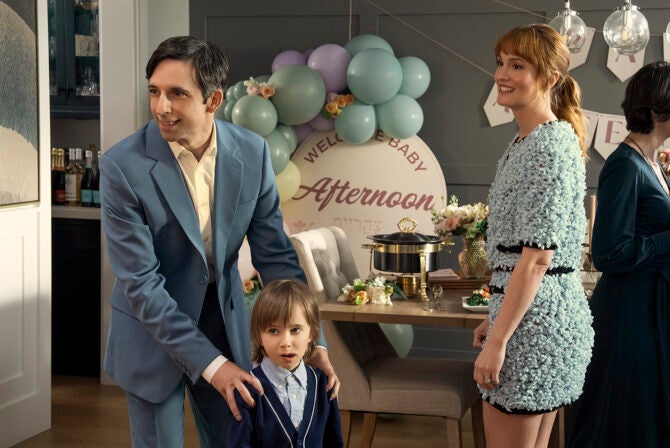The first time I remember talking to Oscar about his younger brother Saul’s special needs, he couldn’t have been more than 5 years old. Definitely still in preschool. There was something–though I can’t remember exactly what–that Oscar thought Saul would like and he said, “Saul is going to do this!” and started flapping his hands and bouncing up and down. I lost it. I couldn’t believe my sweet little boy was making fun of his younger brother who has Fragile X, which is a genetic syndrome and the cause of intellectual disabilities that can include learning problems, autism, anxiety, sensory, and behavioral issues.
As a parent, my biggest fear was that Saul was going to be subject to a lifetime of cruelty from others who didn’t understand his condition, but I didn’t think this cruelty would begin in our own home. I yelled at Oscar–I can’t recall exactly I said–and his face fell. He said, “But Saul will be happy and that’s what he does when he’s happy.” I realized then that he wasn’t mocking his little brother. He was simply acting out the happiness he anticipated from Saul. And I had yelled at him for it. When I agonize over all of the mistakes I’ve made as a mother to three children, this incident always cracks my top 10.
Saul was diagnosed on the first night of Hanukkah in 2007. He was just 1 1/2 at the time. And in the six years since, our family’s life has, often out of necessity, revolved around Saul’s treatment and care–from countless early intervention classes to a variety of therapies to special schools. There are places and things we can’t do together as a family. And at home, Saul’s needs sometimes seem to take priority ahead of those of his “typical” siblings–his twin sister Beatrice and Oscar.
I keep a loop running in my head of all the times I had to say “no” to them. No, I can’t get your dessert, Saul just threw up. Please put yourself to bed, Saul is having a bad night. Sorry, we have to leave the playground, Saul is too tired.
With all of the focus I’ve heaped on Saul and his Fragile X, I sometimes have to remind myself to worry about Oscar and Bea, too. And once I set my mind to this task, I’m usually successful because I’m a really good worrier. An Olympic level worrier, as most Jewish mothers are.
And I had been worried about Oscar. Bea is outgoing and has no trouble talking about her feelings about Saul. Perhaps because of her twin kinship with him, she also seems to be better able to take his behaviors and quirks in stride. Oscar, however, is less outgoing than Bea and can be a bit more closed off. The only other conversation I can remember having with Oscar about Saul took place years ago. I was alone in the car driving him to his karate class, a class that included many sibling pairings. Oscar asked me if Saul would ever take the class with him. I launched into a very long and jumbled explanation that while Saul would continue to learn and grow, there are some things that he’d never be able to do and would always need special help. The whole time I was answering him, I was trying to keep my voice from cracking. Perhaps he noticed the emotion or maybe he had gotten distracted, but when I finally paused, Oscar asked, “Why are we talking about this again?” And so the matter was dropped.
That is, until a few weeks ago. Our whole family–mother, father, and three children–attended the Tikvah Family Shabbaton for families with kids with special needs at Camp Ramah New England.
When my husband and I decided to sign up for this weekend, I thought it would be a disaster. Something that promised to entertain all three of our children seemed like a pipe dream. And Oscar was especially furious at the thought of being away from Minecraft and his iPad for the weekend, not to mention being with other kids with special needs.
If we simply managed to have fun, I thought, the weekend would have been a huge success. But it ended up being so much more than that. We met wonderful families, attended lovely Shabbat services, and most importantly, all of the children had peers and counselors who were perfect for them.
And in that setting, Oscar was finally able to open about his complicated feelings about Saul. I heard that the group Oscar was part of had discussed having a sibling with special needs. Being a nosy mother, I asked the counselor if Oscar had even talked. The counselor assured me that my taciturn eldest son had spoken to the other kids. The counselor was the ideal moderator for such a discussion–she, too, had a sibling with special needs. Everyone that was at the camp for the Tikvah Shabbaton “got it” without needing any sort of explanation.
But the impact of that weekend lasted beyond the trip itself. When we got back from Camp Ramah, Oscar continued to open up. He began with his typical complaint–I always get in trouble but Saul never does–but then, through tears, he told me he was worried about how Saul would feel when he found out that he has Fragile X. I was flabbergasted. I have spent thousands of hours worrying about everything to do with Saul and his condition and yet this is something I never considered. Oscar was worried his younger brother would be upset if he fully grasped his syndrome and his difference from others.
Next, he asked me how I felt when I found out Saul had Fragile X. He had never before asked me how I felt about anything, ever. He’s a 10-year-old boy. I answered honestly–scared, angry, and sad. He told me that sometimes when Saul acts “crazy” he laughs. Not at Saul but to make other kids think that Saul is joking and not different. And then, he asked if they invented a cure for Fragile X, would we give it to Saul and would it change who he was?
As much as Oscar complained about Saul, it seemed that he truly cared for his brother just as he was. I didn’t know how to answer his question, which seemed to be a recurring theme in this conversation. Finally, he asked if there were any fourth graders at his school who had a sibling with special needs.
In the years since Saul’s diagnosis, I’ve surrounded myself with people who understand what I’m going through and are supportive. I have a wonderful group of friends who are mothers of children with Fragile X and we meet once a month. I have other friends, mothers who are parents to kids with other types of special needs that I see often. And I participate in online communities, reading voraciously about others’ experiences raising children with special needs. All of these resources have helped me to feel less alone.
And this is precisely what Oscar found at the Shabbaton–a community that fully understands and accepts him. During that weekend, he finally found a way to open up to his peers in a safe space, moving beyond the petty grievances to the deep, complicated fears and feelings he had about his little brother. It turns out Oscar had been the caring, protective older brother I hoped he’d be to Saul all along.
Like this post? Get the best of Kveller delivered straight to your inbox.







